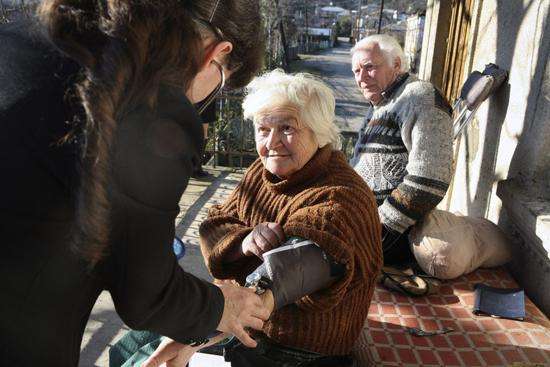
Georgia 2007 © Jean-Marc Giboux
An MSF doctor visits a multidrug-resistant tuberculosis (MDR-TB) patient at home in Soukhoumi, Abkhazia.
To help alleviate difficult treatment conditions and improve adherence, MSF staff at projects in Zougdidi, Georgia, and Soukhoumi, Abkhazia, are now offering patients with multidrug-resistant tuberculosis (MDR-TB) treatment at home. The projects treat 81 and 51 patients, respectively.
A patient has MDR-TB if he or she displays a resistance to at least two of the most powerful molecules employed in first-line treatment of TB: Rifampicine and Isionazide. Resistance is caused by the administering of inadequate or incomplete treatments, the prescribing of poor-quality medicines or direct infection by a resistant strain of the illness.
MDR-TB remains a particularly challenging disease to treat for several reasons: patients must usually be hospitalized to undergo daily injections; patients are often isolated; adverse reactions to agents used to treat MDR-TB are very common; and duration of treatment can be as long as two years.
Because of these constraints, about 50 percent of patients end up interrupting their treatment before it is complete. The inability to offer patients a less toxic and less demanding regime led MSF staff to explore different treatment conditions, including home-care.

Georgia 2007 © Jean-Marc Giboux
This MDR-TB patient is undergoing treatment at home as part of a new home-based care project in Soukhoumi, Abkhazia.
Reducing hospitalization time
Treatment of MDR-TB necessarily begins with hospitalization. It is a difficult period for the patient, with factors such as bad side-effects, separation from loved ones, and decreased income at home. With the new approach employed in Georgia and Abkhazia, MSF cuts down this initial isolation phase; the patient remains hospitalized up until the MDR-TB bacillus is no longer detectable in sputum. Then, with the reduced contagion risk, treatment may continue at home. This means the patient is isolated from his family for a shorter period, and, in many cases, he feels more motivated to continue the treatment.
Continuing treatment at home
Continuation of the treatment can take place at home as long as the patient's living conditions allow. A separate room should be available, as well as proper ventilation and appropriate heating. If required, MSF will perform certain rehabilitation work.
MSF teams provide day-to-day patient support, including regular home visits by psychologists and social workers. These visits give the patients opportunities to talk about their problems. Patients also receive material or financial aid, such as firewood, clothes, and proper nutrition. The improvement of patients' living conditions has an impact on their continuing treatment. In Zougdidi, where home-care has been employed since November 2006, none of the 81 patients has abandoned treatment.
Research and development
Although caring for patients at home ensures better treatment discipline, it changes nothing in terms of the research and development of new tools for TB.
Currently, suitable diagnostic and therapeutic tools are not available for every case, and this situation can only be improved by greater investment in research and development.
Nevertheless, home-care for patients leads to testing new treatment methods, the results of which will be evaluated. Depending on the findings, MSF may consider replicating the scheme on a larger scale.




